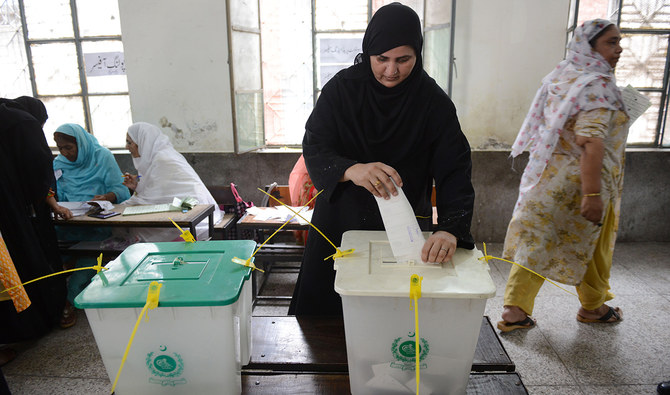ISLAMABAD: Islamabad said on Monday it would take “all appropriate steps” to safeguard its due share of water under the Indus Waters Treaty as the country’s defense minister warned of an imminent military incursion by neighboring India in the aftermath of a deadly militant attack on tourists in Indian-administered Kashmir last week.
The attack killed 26 people and triggered outrage in India, along with calls for action against Pakistan. India accuses Pakistan of backing militancy in Kashmir, a region both claim and have fought two wars over. After Tuesday’s attack, it announced, among a raft of other punitive measures, that it was suspending the 1960 Indus Waters Treaty that splits the Indus River Basin and its tributaries between Pakistan and India. The treaty ensures water for 80 percent of Pakistani farms.
Islamabad has denied any involvement in the Kashmir attack and said any attempt to stop or divert its water would be considered as an “act of war.”
On Monday, Pakistan’s deputy prime minister and foreign minister, Ishaq Dar, chaired a meeting to discuss India’s suspension of the Indus Waters Treaty, which was attended by the law and water resources ministers, Pakistan’s attorney-general, senior officials and technical experts.
“Pakistan will take all appropriate steps to safeguard its due share of water, guaranteed by the Indus Waters Treaty,” the Pakistani foreign ministry said in a statement after the meeting, quoting Dar.
“Pakistan will continue to advocate for the full implementation of the Treaty to ensure the protection of its water rights and the well-being of its people.”
The statement said India’s “unilateral and illegal” move to hold the treaty in abeyance contravened established norms of inter-state relations, international law, and the treaty’s own provisions.
“Noting that the waters of the Indus River System remain a lifeline for Pakistan’s 240 million people, he [Dar] deplored the Indian attempts to weaponize water,” the ministry added.
Tensions between the two nuclear-armed nations continued to boil amid reports their border forces exchanged fire along the de factor border in the disputed Kashmir region for a fourth consecutive day on Sunday. Fear is also rising among experts and officials in Islamabad that India may carry out limited airstrikes or special forces raids near the border with Pakistan.
“We have reinforced our forces because it is something which is imminent now. So in that situation some strategic decisions have to be taken, so those decisions have been taken,” Defense Minister Khawaja Muhammad Asif told Reuters in an interview at his office in Islamabad.
Asif said India’s rhetoric was ramping up and Pakistan’s military had briefed the government on the possibility of an Indian attack. He did not go into further details on his reasons for thinking an incursion was imminent.
Pakistan was on high alert but would only use its nuclear weapons if “there is a direct threat to our existence,” said Asif, a veteran politician and outspoken member of the ruling Pakistan Muslim League-Nawaz party, which has historically pursued peace talks with India.
The minister added that Islamabad had approached friendly countries, including Gulf states and China, and also briefed Britain, the United States and others on the situation.
“Some of our friends in the Arabian Gulf have talked to both sides,” Asif said, without naming the countries.
China said on Monday it hoped for restraint and welcomed all measures to cool down the situation. Asif said the United States was thus far “staying away” from intervening in the matter.
Riyadh and Tehran have also both offered to mediate the crisis.
Pakistan and India have fought multiple wars, including two over the disputed region of Kashmir, since their independence from British rule in 1947. Both rule the valley in part but claim it in full.
In the past, New Delhi has accused Islamabad of backing militants who carried out the 2008 Mumbai attacks, which killed more than 166 people, including foreigners. Pakistan denies the accusations.















